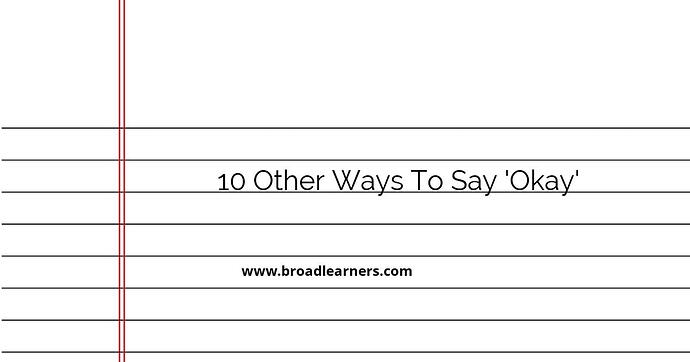When someone asks you a question or gives you an instruction, responding with a simple 'Okay' may seem repetitive or unenthusiastic. Luckily, there are plenty of alternative phrases you can use to convey the same meaning. Here are 10 other ways to say 'Okay':
- Understood
- Got it
- Alright
- Sure
- No problem
- Agreed
- Of course
- Certainly
- Absolutely
- Very well
Each of these phrases can be used in different contexts, so let's explore some examples:
1. Understood
'Understood' is a concise and polite way to acknowledge that you have received and understood the information or request. It is commonly used in professional settings and can indicate that you are ready to proceed.
Example:
Manager: Can you finish this report by tomorrow morning?
You: Understood. I will make sure to complete it on time.
2. Got it
'Got it' is an informal way to indicate that you have understood what was said. It is often used in casual conversations or among friends.
Example:
Friend: Let's meet at the coffee shop at 5 pm.
You: Got it. I'll see you there!
3. Alright
'Alright' is a versatile phrase that can be used to show agreement or acceptance. It can also indicate that you are ready to move forward with a plan or task.
Example:
Colleague: We need to schedule a meeting for next week.
You: Alright, let's find a suitable time for everyone.
4. Sure
'Sure' is a casual and positive way to acknowledge a request or agreement. It conveys a willingness to comply or assist.
Example:
Family member: Can you pick up some groceries on your way home?
You: Sure, I'll stop by the store.
5. No problem
'No problem' is a friendly and reassuring response that indicates you are willing to fulfill a request or task without any difficulty.
Example:
Customer: Could you help me find this book in the library?
You: No problem, I'll assist you in locating it.
6. Agreed
'Agreed' is a concise way to express your acceptance or alignment with a proposal or idea.
Example:
Teammate: Let's divide the tasks equally among the group.
You: Agreed, that sounds fair.
7. Of course
'Of course' is a polite way to indicate that you are willing and happy to comply with a request or agreement.
Example:
Host: Could you please bring a dessert to the party?
You: Of course, I'll bring a homemade pie.
8. Certainly
'Certainly' is a formal and confident way to express your agreement or acceptance of a proposal or request.
Example:
Interviewer: Are you available for a second interview next week?
You: Certainly, I can make myself available.
9. Absolutely
'Absolutely' is a strong and enthusiastic way to indicate your complete agreement or willingness to fulfill a request.
Example:
Teacher: Could you stay after class to discuss your progress?
You: Absolutely, I'd be happy to discuss it with you.
10. Very well
'Very well' is a formal and respectful way to acknowledge a request or instruction. It conveys a sense of understanding and readiness to comply.
Example:
Supervisor: Please review this document and provide your feedback by tomorrow.
You: Very well, I'll make sure to review it thoroughly.
By using these alternatives to 'Okay', you can enhance your communication skills and vary your responses to show more engagement and understanding. Remember to choose the appropriate phrase based on the context and level of formality.
Did I miss anything? Respond below
